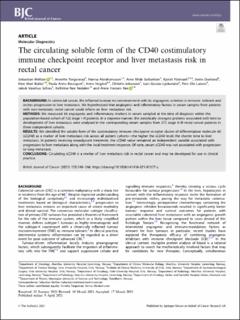The circulating soluble form of the CD40 costimulatory immune checkpoint receptor and liver metastasis risk in rectal cancer
Meltzer, Sebastian; Kristensen, Annette Torgunrud; Abrahamsson, Hanna Josefine; Solbakken, Arne Mide; Flatmark, Kjersti; Dueland, Svein; Bakke, Kine Mari; Bousquet, Paula; Negård, Anne; Johansen, Christin; Lyckander, Lars Gustav; Larsen, Finn Ole; Schou, Jakob Vasehus; Redalen, Kathrine; Ree, Anne Hansen
Peer reviewed, Journal article
Published version

View/
Date
2021Metadata
Show full item recordCollections
- Institutt for fysikk [2713]
- Publikasjoner fra CRIStin - NTNU [38688]
Abstract
Background
In colorectal cancer, the inflamed tumour microenvironment with its angiogenic activities is immune- tolerant and incites progression to liver metastasis. We hypothesised that angiogenic and inflammatory factors in serum samples from patients with non-metastatic rectal cancer could inform on liver metastasis risk.
Methods
We measured 84 angiogenic and inflammatory markers in serum sampled at the time of diagnosis within the population-based cohort of 122 stage I–III patients. In a stepwise manner, the statistically strongest proteins associated with time to development of liver metastasis were analysed in the corresponding serum samples from 273 stage II–III rectal cancer patients in three independent cohorts.
Results
We identified the soluble form of the costimulatory immune checkpoint receptor cluster of differentiation molecule 40 (sCD40) as a marker of liver metastasis risk across all patient cohorts—the higher the sCD40 level, the shorter time to liver metastasis. In patients receiving neoadjuvant treatment, the sCD40 value remained an independent variable associated with progression to liver metastasis along with the local treatment response. Of note, serum sCD40 was not associated with progression to lung metastasis.
Conclusions
Circulating sCD40 is a marker of liver metastasis risk in rectal cancer and may be developed for use in clinical practice.
